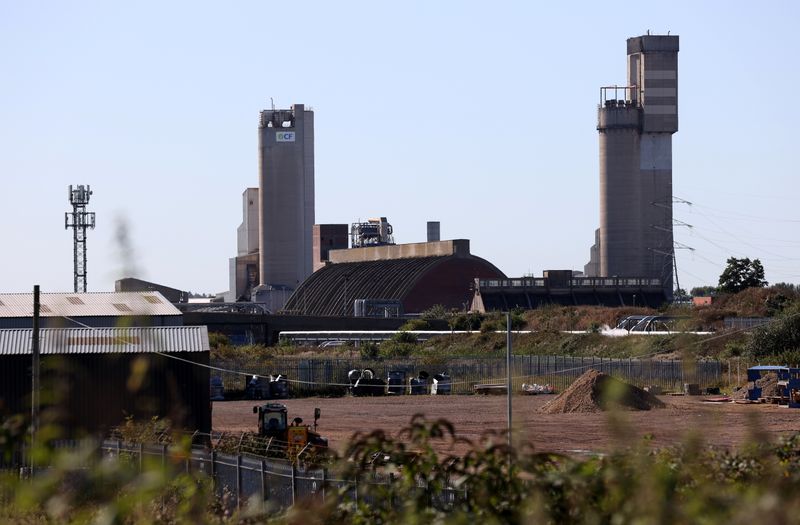By Guy Faulconbridge, Kate Holton and James Davey
LONDON (Reuters) - Britain warned its food producers on Wednesday to prepare for a 400% rise in carbon dioxide prices after extending emergency state support to avert a shortage of poultry and meat triggered by soaring costs of wholesale natural gas.
Natural gas prices have spiked this year as economies reopened from COVID-19 lockdowns and high demand for liquefied natural gas in Asia pushed down supplies to Europe, sending shockwaves through industries reliant on the energy source.
Carbon dioxide (CO2) is a by-product of the fertilizer industry - Britain's main source of CO2 - where natural gas is the biggest input cost. Industrial gas companies, including Linde (NYSE:LIN), Air Liquide (OTC:AIQUY) and Air Products and Chemicals (NYSE:APD), get their CO2 mainly from fertilizer plants.
The natural gas price surge has forced some fertilizer plants to shut in recent weeks, leading to a shortage of CO2 used to put the fizz into beer and sodas and stun poultry and pigs before slaughter.
As CO2 stocks dwindled, Britain struck a deal with U.S. company CF Industries (NYSE:CF), which supplies some 60% of Britain's CO2, to restart production at two plants which were shut because they had become unprofitable due to the gas price rise.
"We need the market to adjust, the food industry knows there's going to be a sharp rise in the cost of carbon dioxide," Environment Secretary George Eustice told Sky News.
It would have to accept that the price of CO2 would rise sharply, to around 1,000 pounds ($1,365) a tonne from 200 pounds a tonne, Eustice said, adding: "So a big, sharp rise."
The three-week support for CF would cost "many millions, possibly tens of millions but it's to underpin some of those fixed costs," Eustice said.
A spokesperson for Prime Minister Boris Johnson said the government was giving CF the difference between its total production costs and what it receives from the sale of CO2.
Business Secretary Kwasi Kwarteng, who also serves as energy minister, told lawmakers he was confident the country could also secure other sources of the gas.
It was not immediately clear how the state intervention by one of Europe's most traditionally laissez-faire governments would affect the price of fertilizer - another key cost for food producers - and whether or not it would stoke demands from other energy-heavy industries for similar state support.
CHRISTMAS SHORTAGES?
Ministers, including Johnson, have repeatedly brushed aside suggestions there could be shortages of traditional Christmas fare such as roast turkey, though some suppliers have warned of them.
Kwarteng has said there would be no return to the 1970s when Britain was plagued by power cuts that made the economy the "sick man of Europe", with three-day working weeks and people unable to heat their homes.
Eustice said without the deal some of Britain's meat and poultry processors would have run out of CO2 within days.
"We know that if we did not act, then by this weekend or certainly by the early part of next week, some of the poultry processing plants would need to close," he added.
He said the impact on food prices would be negligible.
But the boss of supermarket Iceland said the temporary arrangement would not solve the food industry's problems.
"A three week deal won’t save Christmas," said managing director Richard Walker. "And certainly won’t resolve the issue in the long term."
The British Poultry Council welcomed the deal but said the industry was still facing huge pressures from labour shortages and estimated Christmas turkey production will be down by 20% this year.
Similarly the British Meat Processors Association expressed "huge relief".
"We are focused on re-establishing (CO2) supplies before Friday this week which is when around 25% of pork production was in danger of shutting down," it said.
Britain's Food and Drink Federation said there will still be shortages of some products though they will not be as bad as previously feared, while the British Soft Drinks Association warned it would take up to two weeks before production from CF made any positive impact on market conditions.
Marks & Spencer (OTC:MAKSY), which typically sells one in four fresh turkeys consumed in the United Kingdom at Christmas, struck a more optimistic note, saying it was confident of full supply.

Britain's opposition Labour party said the government needed to explain the contingency plans in place in case the C02 issues are not resolved in three weeks.
($1 = 0.7328 pounds)